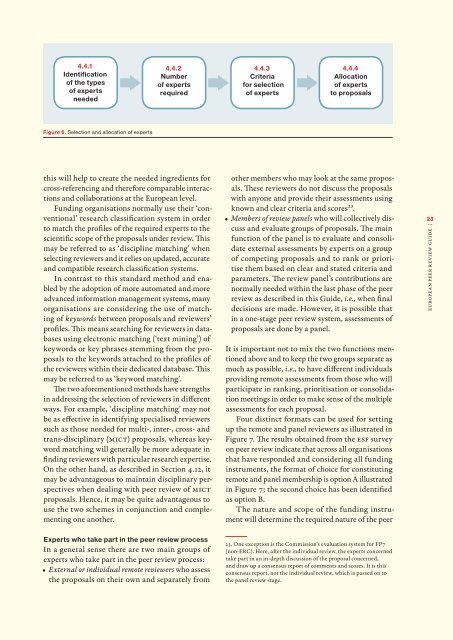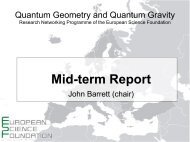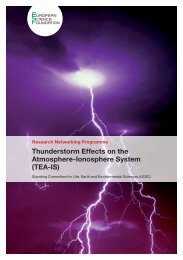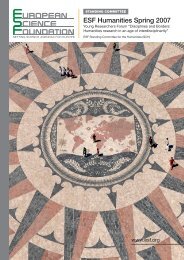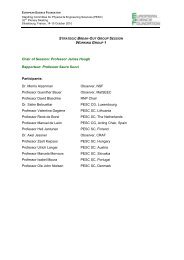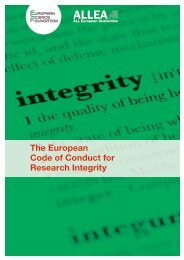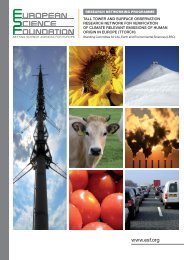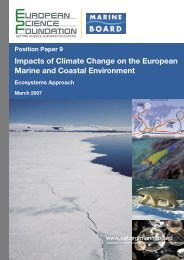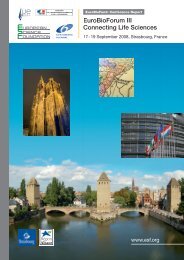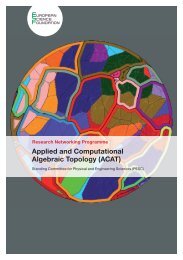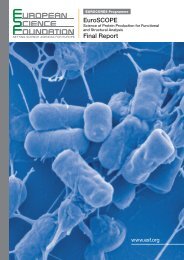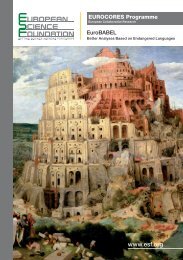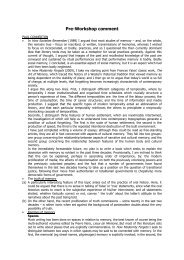European Peer Review Guide - European Science Foundation
European Peer Review Guide - European Science Foundation
European Peer Review Guide - European Science Foundation
Create successful ePaper yourself
Turn your PDF publications into a flip-book with our unique Google optimized e-Paper software.
4.4.1<br />
Identification<br />
of the types<br />
of experts<br />
needed<br />
4.4.2<br />
Number<br />
of experts<br />
required<br />
4.4.3<br />
Criteria<br />
for selection<br />
of experts<br />
† † † to<br />
4.4.4<br />
Allocation<br />
of experts<br />
proposals<br />
Figure 6. Selection and allocation of experts<br />
this will help to create the needed ingredients for<br />
cross-referencing and therefore comparable interactions<br />
and collaborations at the <strong>European</strong> level.<br />
Funding organisations normally use their ‘conventional’<br />
research classification system in order<br />
to match the profiles of the required experts to the<br />
scientific scope of the proposals under review. This<br />
may be referred to as ‘discipline matching’ when<br />
selecting reviewers and it relies on updated, accurate<br />
and compatible research classification systems.<br />
In contrast to this standard method and enabled<br />
by the adoption of more automated and more<br />
advanced information management systems, many<br />
organisations are considering the use of matching<br />
of keywords between proposals and reviewers’<br />
profiles. This means searching for reviewers in databases<br />
using electronic matching (‘text mining’) of<br />
keywords or key phrases stemming from the proposals<br />
to the keywords attached to the profiles of<br />
the reviewers within their dedicated database. This<br />
may be referred to as ‘keyword matching’.<br />
The two aforementioned methods have strengths<br />
in addressing the selection of reviewers in different<br />
ways. For example, ‘discipline matching’ may not<br />
be as effective in identifying specialised reviewers<br />
such as those needed for multi-, inter-, cross- and<br />
trans-disciplinary (MICT) proposals, whereas keyword<br />
matching will generally be more adequate in<br />
finding reviewers with particular research expertise.<br />
On the other hand, as described in Section 4.12, it<br />
may be advantageous to maintain disciplinary perspectives<br />
when dealing with peer review of MICT<br />
proposals. Hence, it may be quite advantageous to<br />
use the two schemes in conjunction and complementing<br />
one another.<br />
other members who may look at the same proposals.<br />
These reviewers do not discuss the proposals<br />
with anyone and provide their assessments using<br />
known and clear criteria and scores23.<br />
• Members of review panels who will collectively discuss<br />
and evaluate groups of proposals. The main<br />
function of the panel is to evaluate and consolidate<br />
external assessments by experts on a group<br />
of competing proposals and to rank or prioritise<br />
them based on clear and stated criteria and<br />
parameters. The review panel’s contributions are<br />
normally needed within the last phase of the peer<br />
review as described in this <strong>Guide</strong>, i.e., when final<br />
decisions are made. However, it is possible that<br />
in a one-stage peer review system, assessments of<br />
proposals are done by a panel.<br />
It is important not to mix the two functions mentioned<br />
above and to keep the two groups separate as<br />
much as possible, i.e., to have different individuals<br />
providing remote assessments from those who will<br />
participate in ranking, prioritisation or consolidation<br />
meetings in order to make sense of the multiple<br />
assessments for each proposal.<br />
Four distinct formats can be used for setting<br />
up the remote and panel reviewers as illustrated in<br />
Figure 7. The results obtained from the ESF survey<br />
on peer review indicate that across all organisations<br />
that have responded and considering all funding<br />
instruments, the format of choice for constituting<br />
remote and panel membership is option A illustrated<br />
in Figure 7; the second choice has been identified<br />
as option B.<br />
The nature and scope of the funding instrument<br />
will determine the required nature of the peer<br />
23<br />
<strong>European</strong> <strong>Peer</strong> <strong>Review</strong> <strong>Guide</strong><br />
Experts who take part in the peer review process<br />
In a general sense there are two main groups of<br />
experts who take part in the peer review process:<br />
• External or individual remote reviewers who assess<br />
the proposals on their own and separately from<br />
23. One exception is the Commission’s evaluation system for FP7<br />
(non-ERC). Here, after the individual review, the experts concerned<br />
take part in an in-depth discussion of the proposal concerned,<br />
and draw up a consensus report of comments and scores. It is this<br />
consensus report, not the individual review, which is passed on to<br />
the panel review stage.


